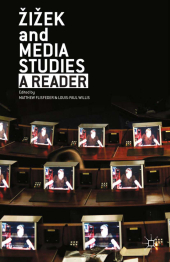 Neuerscheinungen 2014Stand: 2020-02-01 |
Schnellsuche
ISBN/Stichwort/Autor
|
Herderstraße 10
10625 Berlin
Tel.: 030 315 714 16
Fax 030 315 714 14
info@buchspektrum.de |

M. Flisfeder, L. Willis
(Beteiligte)
Zizek and Media Studies
A Reader
Herausgegeben von Flisfeder, M.; Willis, L.
1st ed. 2014. 2014. xiii, 312 S. 216 mm
Verlag/Jahr: SPRINGER PALGRAVE MACMILLAN; PALGRAVE MACMILLAN US 2014
ISBN: 1-349-47409-6 (1349474096)
Neue ISBN: 978-1-349-47409-7 (9781349474097)
Preis und Lieferzeit: Bitte klicken
Film, media, and cultural theorists have long appealed to Lacanian theory in order to discern processes of subjectivization, representation, and ideological interpellation. Here, the contributors take up a Zizekian approach to studies of cinema and media, raising questions about power, ideology, sexual difference, and enjoyment.
Introduction: Zizek and Media Studies, Beyond Lacan; Matthew Flisfeder and Louis-Paul Willis PART I: MEDIA, IDEOLOGY, AND POLITICS 1. Zizek´s Reception: Fifty Shades of Gray Ideology; Paul A. Taylor 2. The Sublime Absolute: Althusser, Zizek, and the Critique of Ideology; Agon Hamza 3. Student Fantasies: A Zizekian Perspective on the 2012 Quebec Student Uprising; Louis-Paul Willis 4. The Objective: The Configuration of Trauma in the ´War on Terror,´ or the Sublime Object of the Medium; Richard Begin PART II: POPULAR CULTURE 5. The Priority of the Example: Hegel Contra Film Studies; Todd McGowan 6. Imagining the End Times: Ideology, the Contemporary Disaster Movie, and Contagion; Matthew Beaumont 7. Zizek and the 80s Movie Song: "There Is a Non-Relationship"; Graham Wolfe 8. A Little Piece of the Reel: Prosthetic Vocality and the Obscene Surplus of Record Production; Mickey Vallee 9. White Elephants and Dark Matter(s): Watching the World Cup with Slavoj Zizek; Tim Walters PART III: FILM AND CINEMA 10. Contingent Encounters and Retroactive Signification: Zooming in on the Dialectical Core of Zizek´s Film Criticism; Fabio Vighi 11. How to Kill Your Mother: Heavenly Creatures, Desire and Zizek´s Return to Ideology; Cindy Zeiher 12. Dialogue with American Skepticism: Cavell and Zizek on Sexual Difference; Keiko Ogata 13. From Interpassive to Interactive Cinema: A Genealogy of the Moving Image of Cynicism; Tamas Nagypal 14. Beyond the Beyond: CGI and the Anxiety of Overperfection; Hugh Manon PART IV: SOCIAL MEDIA AND THE INTERNET 15. Slavoj Zizek as Internet Philosopher; Clint Burnham 16. The Real Internet; Jodi Dean 17. Enjoying Social Media; Matthew Flisfeder 18. Is Torture Part of Your Social Network; Tara Atluri Afterword: Staging Feminine Hysteria: Schoenberg´s Erwartung; Slavoj Zizek
"Text thus presents a broad topology of a potential field of interrogation. ... recommend this book as both an introduction to the proposed field of Zizekian media studies itself, but also as an important overview of the evolution of psychoanalytic theory for a postmodern present. ... An admirable job is done in the introduction to make the reader as a whole quite accessible and to present the current state of psychoanalysis and media studies in a historical and philosophical context." (Sean Rupka, Canadian Journal of Communication, Vol. 41, 2016)
"Flisfeder and Willis completely reshape our understanding of the history of psychoanalytic film theory by contextualizing it through Slavoj i ek´s impact. i ek and Media Studies comes at a time when contemporary psychoanalytic film theory has changed substantially and this contribution is thus required reading." - Hilary Neroni, Film and Television Studies, University of Vermont, USA and author of The Subject of Torture: Psychoanalysis, Biopolitics, and Media Representations
"One thing that makes reading i ek so interesting and (let´s be honest) entertaining is the way he engages popular culture and media. Unfortunately the impact of this effort has been largely underappreciated within the discipline of Media Studies. This book repairs that deficiency by developing a distinctly i ekian approach to media scholarship. It is indispensable for anyone interested in i ek and a must-read for students, teachers, and researchers in Media, Film, and Communication Studies." - David J. Gunkel, Professor, Northern Illinois University, USA and author of The Machine Question and Heidegger and the Media


